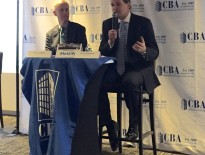
The Kraft Foods Group property off Montvale Avenue in Woburn could be redeveloped into a large mixed-use project including offices, retail space and housing.
Some locals refer to it as “The Gelly” – a nod to its longtime role as manufacturer of gelatin and other food ingredients. Others associate it with complaints from neighbors about the unsavory odors that emerged from its smokestacks.
Permanently idle since the New Year, the 107-acre Kraft Foods Group property in Woburn could represent a once-in-a-generation opportunity for real estate investors and the city’s economic prospects. Located along I-93 eight miles north of Boston, it’s attracting widespread interest from developers.
Multiple teams of potential buyers have toured the site near the Montvale Avenue exit in recent weeks, entertaining visions of a large mixed-use redevelopment, said Justin Smith, a managing director at Newmark Grubb Knight Frank in Boston.
“On a global level, this development offers very attractive demographics for developers who are not New England-based,” Smith said. “There’s very few 100-acre sites available on the entire East Coast.”
The 400,000-square-foot factory and the bulk of the buildable land are located in Woburn, with a half-mile of frontage along I-93 and its 200,000-plus daily traffic counts. The rest of the land is in Stoneham and Winchester.
City Willing To Offer Incentives
Kraft Foods Group has hired an engineering firm to map wetlands and narrow down the buildable acreage. The property is being marketed by Newmark Grubb Knight Frank and Cushman & Wakefield of Illinois without an asking price.
For developers, uncertainties include the scope of development that is eventually approved by the city and the extent of environmental contamination. The state Department of Environmental Protection lists 12 hazardous waste sites associated with the property. The property is in compliance with the DEP’s contingency plan, according to a June 16 audit signed by Patricia Donahue, chief of the audit section for the DEP’s bureau of waste site cleanup.
One comparable sale could be the 12-acre former W.R. Grace site at 369 Washington St., which sold for $4.1 million in December 2014 to Boston-based Madison Properties. Developer Denis Dowdle is in pre-construction for a 250-room hotel and two sit-down restaurants after winning final approvals in July.
The Kraft Foods property is currently zoned industrial, but Woburn Mayor Scott Galvin said he will submit a mixed-use rezoning plan for the property to the city council by early February.
Galvin said the plant’s closure presents a “once-in-a-lifetime” opportunity for the city of 38,000 to broaden its commercial tax base.
The only access to the property is from Hill Street, a narrow two-lane road off Montvale Avenue wedged between a McDonald’s restaurant and a Comfort Inn. The city plans to apply for MassWorks infrastructure grants to upgrade the road network, Galvin said. A $4.8 million project that would widen a congested stretch of Montvale Avenue between Washington Street and I-93 is already part of the state’s transportation improvement plan, with a projected spring 2017 start date.
Woburn also would consider offering tax increment financing agreements “for the right development,” Galvin said.
From Factory Town To Life
Science Hub
The eventual buyer will have an opportunity to write a new chapter in the economic history of this former manufacturing community.
Tanneries and shoemakers expanded in Woburn during the industrial revolution, drawn by its location along the Boston and Lowell Railroad line and the Middlesex Canal. By the mid-20th century, the industries had departed, but left a trail of pollution in local waterways, as depicted in the 1998 legal drama “A Civil Action.”
In recent decades, much of Woburn’s industrial real estate has been converted into office and lab space. Woburn-based Cummings Properties has built a 10-million-square-foot commercial portfolio in the suburbs north of Boston, including 4.6 million square feet in Woburn. Cummings converted industrial buildings into office, lab and flex space beginning in the 1980s, said Eric Anderson, Cummings’ executive vice president.
“As we renovated the buildings, the life sciences have become a bigger part of what we do here. Those properties have evolved,” Anderson said.
Life science startups from Cambridge and incubators have moved to Woburn, where commercial rents are less than half of those in traditional science areas like Kendall Square. Local startups such as Biovex and Pluromed were acquired by industry giants Amgen and Sanofi, respectively, in recent years, but kept their local operations in Woburn.
The new owners of the Kraft Foods property are likely to follow the lead of suburban developers who have converted industrial or aging office properties into mixed-use developments, including restaurants, stores and housing. Creating a walkable, vibrant atmosphere is seen as essential to competing with downtown workspaces for 21st-century growth industries.
“The 128 belt is becoming more attractive for businesses to locate here as they expand,” said Robert Buckley, a senior partner at law firm Riemer & Braunstein’s real estate practice. “Supplementing that is the desire to add amenities, so the talent can be enticed to leave the mecca of Boston to go out here for work.”







